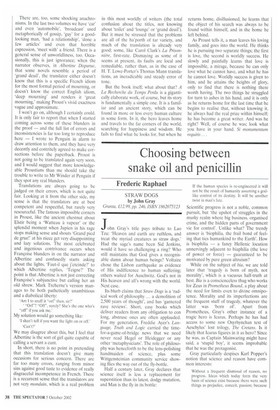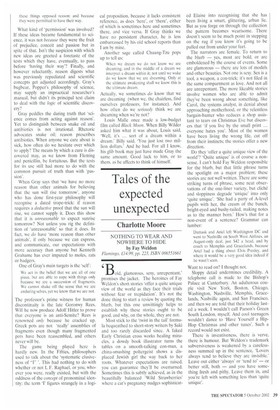Choosing between snake oil and penicillin
Frederic Raphael
STRAW DOGS by John Gray
Granta, £12.99, pp. 246, ISBN 1862075123
John Gray's title pays tribute to Lao Tzu: 'Heaven and earth are ruthless, and treat the myriad creatures as straw dogs.' Had the sage's name been Sid Jenkins, would it have so challenging a ring? Who still maintains that God gives a recognisable damn about human beings? Voltaire chose the Lisbon earthquake as evidence of His indifference to human suffering; others waited for Auschwitz. God's not in His heaven and all's wrong with the world. Next case.
Its blurb claims that Straw Dogs is a 'radical work of philosophy ... a demolition of 2.500 years of thought', and has 'garnered rave reviews'. Short, easy books which deliver readers from any obligation to con long, abstruse ones are often applauded. For my generation, Freddie Ayer's Language, Truth and Logic carried the timefor-a-game-of-bridge news that we need never read Hegel or Heidegger or any other 'metaphysicians'. The role of philosophy was henceforth to be the lens-polishing handmaiden of science, plus some Wittgensteinian community service showing flies the way out of the fly-bottle.
Half a century later, Gray declares that science itself is less a replacement for superstition than its latest, dodgy mutation, and Man is the fly in its bottle:
If the human species is re-engineered it will not be the result of humanity assuming a godlike control of its destiny. It will be another twist in man's fate.
Scientific progress is not a noble, common pursuit, but 'the upshot of struggles in the murky realm where big business, organised crime, and the hidden parts of government vie for control'. Unlike what? The trendy answer is tiophilia, the frail bond of feeling that ties humankind to the Earth'. How is biophilia — a fancy Hellenic locution unnervingly adjacent to biaphilia (the love of power or force) — guaranteed to be motivated by pure green altruism?
While on the subject of bia, we are told later that 'tragedy is born of myth, not morality', which is a vacuous half-truth at best. Bia is a conscienceless thug who works for Zeus in Prometheus Bound, a play about the need for limits even to divine omnipotence. Morality and its imperfections are the frequent stuff of tragedy, whatever the latter was 'born of'. Apart from Prometheus, Gray's other instance of a tragic hero is Icarus. Perhaps he has had access to some new Oxyrhynchan text of Aeschylus' lost trilogy, The Cretans. Is it likely that Icarus figures in it as hero? Since he was, as Captain Mainwaring might have said, a 'stupid boy', it seems improbable that he was the protagonist.
Gray particularly despises Karl Popper's notion that science and reason have common interests:
Without a frequent dismissal of reason, no progress. Ideas which today form the very basis of science exist because there were such things as prejudice, conceit, passion; because these things opposed reason; and because they were permitted to have their way.
What kind of 'permission' was involved? If these ideas became fundamental to science, it was not because they were the fruit of prejudice, conceit and passion but in spite of that. Isn't the suspicion with which new ideas are greeted a foretaste of the tests which they have, eventually, to pass before 'having their way'? Finally, and however reluctantly, reason digests what was previously repudiated and scientific concepts get adjusted accordingly. Gray's bugbear, Popper's philosophy of science, may supply an impractical researcher's manual, but didn't its principal text claim to deal with the logic of scientific discovery?
Gray peddles the daring truth that 'science comes from acting against reason'. Yet to distinguish between snake oil and antibiotics is not irrational. Rhetoric advocates snake oil; reason prescribes antibiotics. When anyone we care about is sick, how often do we hesitate over which to apply? The means by which a cure is discovered may, as we know from Fleming and penicillin, be fortuitous. But the tests for its use still had more to do with the common pursuit of truth than with 'passion'.
When Gray says that `we have no more reason than other animals for believing that the sun will rise tomorrow', anyone who has done first-year philosophy will recognise a dated trope-trick: if reason requires a deductive proof that the sun will rise, we cannot supply it. Does this show that it is unreasonable to expect sunrise tomorrow? Not unless you rig the definition of `unreasonable' so that it does. In fact, we do have `more reason than other animals', if only because we can express, and communicate, our expectations with more accuracy than anyone but Kenneth Grahame has ever imputed to moles, rats or badgers.
One of Gray's main targets is the 'self':
We act in the belief that we are all of one piece, but are able to cope with things only because we are a succession of fragments. We cannot shake off the sense that we arc enduring selves, yet we know that we are not.
The professor's prime witness for human discontinuity is the late Goronwy Rees. Will he now produce Adolf Hitler to prove that everyone is an anti-Semite? Rees is renowned only because he cracked up. Greek pots are not `really' assemblies of fragments even though many fragmented pots have been reassembled, and others never will be.
The game being played here is hardly new. In the Fifties, philosophers used to talk about the `systematic elusiveness of "I" '. This had nothing to do with whether or not I. F. Raphael, or you, whoever you were, really existed, but with the oddness of the concept of pronominal identity: the term 'I' figures strangely in a logi
cal proposition, because it lacks consistent reference, as does 'here', or 'there', either of which is sometimes here and sometimes there, and vice versa. If Gray thinks we have no persistent character, he is less embarrassed by his old school reports than I am by mine.
Another sage called Chuang-Tzu pops up to tell us:
When we dream we do not know we are dreaming, and in the middle of a dream we interpret a dream within it; not until we wake do we know that we are dreaming. Only at the ultimate awakening shall we know this is the ultimate dream.
Actually, we sometimes do know that we are dreaming (when we, the chairless, find ourselves professors, for instance). And how often do we seriously think we are dreaming when we're not?
Louis Malle once made a low-budget film called Black Moon. When Billy Wilder asked him what it was about, Louis said, `Well, it's .,. sort of a dream within a dream.' Billy said, 'You just lost two million dollars.' And he had. For all I know, his glib book may just have made Gray the same amount. Good luck to him, or to them, as he affects to think of himself.





































































 Previous page
Previous page